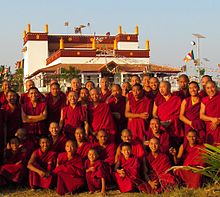You are currently logged-out. You can log-in or create an account to see more talks, save favorites, and more. more info
Sangha Talks

Saṅgha or saṃgha (IPA: [sɐŋɡʱɐ]) is a term meaning "association", "assembly", "company" or "community". In a political context, it was historically used to denote a governing assembly in a republic or a kingdom, and for a long time, it has been used by religious associations, including Buddhists, Jains and Sikhs. Given this history, some Buddhists have stated that the tradition of the sangha represents humanity's oldest surviving democratic institution.
In Buddhism, sangha refers to the monastic communities of bhikkhu (monks) and bhikkhuni (nuns). These communities are traditionally referred to as the bhikkhu-sangha or the bhikkhuni-sangha. As a separate category, those Buddhists who have attained any of the four stages of enlightenment, whether or not they are members of the monastic community, are referred to as the āryasaṅgha ("noble Sangha").
According to the Theravada school and Nichiren Shoshu Buddhism, the term sangha does not refer to the community of unenlightened sāvakas (lay followers) nor does it refer to the community of Buddhists as a whole. Instead, the Theravada school uses the term parisā ("assembly") or catuparisā ("fourfold assembly") to refer to the bhikkhu, bhikkhunī, upāsaka, and upāsikā as a collective.